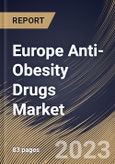The pharmaceutical industry is witnessing a growth in the number of mergers and acquisitions taking place between businesses that are developing medications for metabolic illnesses such as diabetes, obesity, and other conditions of a similar nature. The pharmaceutical industry is currently putting into action a strategic plan in order to expand its drug portfolios in the area of metabolic illnesses, as well as to bring safe and effective new medications to the market. For instance, firms are entering into a strategic partnership to identify and develop therapeutic molecules for the treatment of metabolic disorders like obesity, diabetes, and other problems associated with these diseases.
In recent years, the pharmaceutical industry has focused on gut hormones such as amylin, glucagon-like peptide‐1 (GLP-1), glucose-dependent insulinotropic peptide (GIP), and (peptide tyrosine-tyrosine) PYY for drug development. These hormones play a crucial role in regulating appetite and weight. Several of these medications are utilized for the management of both type 2 diabetes and obesity.
In Germany, a significant proportion of the population, specifically 67% of men and 53% of women, are overweight. Approximately 23% of male adults and 24% of female adults are classified as obese. Obesity and being overweight can lead to various health problems and increase the risk of chronic illnesses. The rising prevalence and related illnesses result in significant healthcare and social welfare expenses. The problem of being overweight and obesity holds significant importance in the public sphere. The increasing government initiatives to counter obesity and its growing burden are expected to surge the demand for anti-obesity drugs for treatment and therefore dive the market growth in the region.
The Germany market dominated the Europe Anti-Obesity Drugs Market by Country in 2022 and would continue to be a dominant market till 2029; thereby, achieving a market value of $205.5 million by 2029. The UK market is anticipated to grow at a CAGR of 9.5% during (2023-2029). Additionally, The France market would exhibit a CAGR of 11.2% during (2023-2029).
Based on Drug Type, the market is segmented into Prescription Drugs and Over the Counter Drugs. Based on Mechanism of Action, the market is segmented into Centrally Acting and Peripherally Acting. Based on Route of Administration, the market is segmented into Oral Route and Subcutaneous Route. Based on Distribution Channel, the market is segmented into Hospital Pharmacies, Retail Pharmacies, and Online Pharmacies. Based on countries, the market is segmented into Germany, UK, France, Russia, Spain, Italy, and Rest of Europe.
The market research report covers the analysis of key stake holders of the market. Key companies profiled in the report include Pfizer, Inc., Boehringer Ingelheim International GmbH, GlaxoSmithKline PLC, Novo Nordisk A/S, Rhythm Pharmaceuticals, Inc., Gelesis Holdings Inc. (PureTech Health), Currax Pharmaceuticals LLC (Currax Holdings USA LLC), Vivus LLC, CHEPLAPHARM Arzneimittel GmbH (Braun Beteiligungs GmbH) and KVK Tech, Inc.
Scope of the Study
By Drug Type
- Prescription Drugs
- Over The Counter Drugs
By Mechanism of Action
- Centrally Acting
- Peripherally Acting
By Route Of Administration
- Oral Route
- Subcutaneous Route
By Distribution Channel
- Hospital Pharmacies
- Retail Pharmacies
- Online Pharmacies
By Country
- Germany
- UK
- France
- Russia
- Spain
- Italy
- Rest of Europe
Key Market Players
List of Companies Profiled in the Report:
- Pfizer, Inc.
- Boehringer Ingelheim International GmbH
- GlaxoSmithKline PLC
- Novo Nordisk A/S
- Rhythm Pharmaceuticals, Inc.
- Gelesis Holdings Inc. (PureTech Health)
- Currax Pharmaceuticals LLC (Currax Holdings USA LLC)
- Vivus LLC
- CHEPLAPHARM Arzneimittel GmbH (Braun Beteiligungs GmbH)
- KVK Tech, Inc.
Unique Offerings
- Exhaustive coverage
- The highest number of Market tables and figures
- Subscription-based model available
- Guaranteed best price
- Assured post sales research support with 10% customization free
Table of Contents
Companies Mentioned
- Pfizer, Inc.
- Boehringer Ingelheim International GmbH
- GlaxoSmithKline PLC
- Novo Nordisk A/S
- Rhythm Pharmaceuticals, Inc.
- Gelesis Holdings Inc. (PureTech Health)
- Currax Pharmaceuticals LLC (Currax Holdings USA LLC)
- Vivus LLC
- CHEPLAPHARM Arzneimittel GmbH (Braun Beteiligungs GmbH)
- KVK Tech, Inc.








